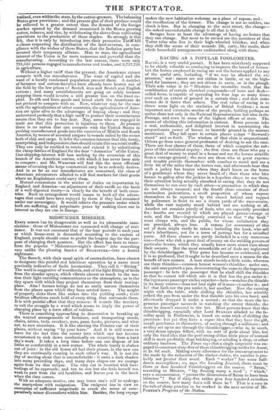MIDSUMMER MISERIES.
Every season has its disagreeable as well as its pleasurable asso- ciations : those of Midsummer are connected with change of resi- dence. It was not unnatural that of the four periods in each year at which house-rent is demanded according to the custom of England, people should come to prefer the longest day for the pur- pose of changing their quarters. But the effect has been to trans- form the popular "Midsummer-night's dream" into something very unlike the pleasing fancies of SHAESPERE—into a horrid nightmare.
The Scotch, with their usual spirit of contradiction, have chosen to designate this painful and laborious operation by a name most poetically indicative of facile locomotion. They call it " flitting." The word is suggestive of woodlands, and of the light flitting of birds from the slender sprays, which vibrate almost as much to the mo- tion their light carolling communicates to the atmosphere, as to the tiny spurn with which they project themselves from their resting- place. Alas ! human beings do not so easily unroot themselves from the places upon which they have settled down. The weight of property sinks them like stakes into the yielding earth ; their birdlime affections catch hold of every thing that surrounds them. It is with painful effort that they remove: it sounds like mockery to call the struggle by a word which seems to imply the power of changing place by a mere effort of volition.
There is something approaching to desecration in breaking up the wonted arrangements of furniture, and transporting stools, chairs, tables, beds, crockery, pots, pans, books, pictures, and what not, to new situations. It is like shoving the Penates out of their places, without saying "by your leave." And it is still worse to leave for the last time the corner into which one has become accustomed to sink down mechanically on returning from a hard day's work. It takes a long time before one can dispose of his limbs so comfortably in a new corner. The whole family is shaken out of joint : in the old house all had their places, in the new one they are continually running in each other's way. It is not the day of moving alone that is uncomfortable : it casts a dark shadow into many preceding days, and many days elapse ere we emerge again from its dim eclipse. The very cat is haunted with fore- bodings of its approach ; and ten to one but she feels herself too weak to part from the old localities, and leaves you in the lurch when the time comes.
With an adequate motive, one may brace one's self to undergo the martyrdom with resignation. The emigrant has in view an enterprise of sufficient magnitude to crush the sense of com- paratively minor discomforts within him. Besides, the long voyage
makes the new habitation welcome as a place of repose, and . the recollection of the former. The change is not so sudden, the shock is less. But in changing to the next street, the change— the naked uncomfortable change is all that is felt.
Savages have at least the advantage of having no homes that they can change. But most to be envied are the members of that Tartar tribe who live in their high-wheeled kibitkas, and when they shift the scene of their pomade life, carry, like snails, their whole household arrangements undisturbed along with them.


























 Previous page
Previous page